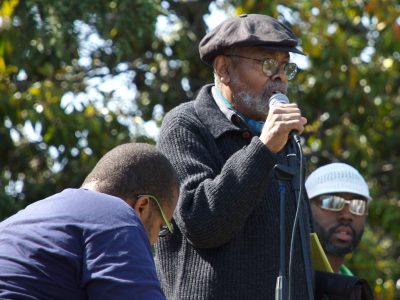Amiri Baraka was an American poet, playwright, and activist who used his writing as a means to promote political change and address social issues. Born Everett LeRoi Jones on 7 October 1934, in Newark, New Jersey, he changed his name to Amiri Baraka in 1965 after embracing a new cultural identity as an African American Muslim. Throughout his life, his works spanned several genres and reflected various ideologies.
Early life and career
Baraka’s early life saw him spending significant time in the arts, having studied at Rutgers University and Howard University before joining the Air Force. After leaving the military due to unfortunate circumstances, he continued his education at Columbia University while supporting himself with various jobs.
However, it was in the late 1950s that Baraka rose to prominence in the New York City arts scene. As part of the Beat movement – a group of artists, poets, and writers who rebelled against mainstream culture – he found inspiration from other notable figures such as Allen Ginsberg and Jack Kerouac.
Ideologies
Throughout his career, Baraka engaged with multiple ideologies that evolved as he matured. Initially influenced by Marxism and Black Nationalism – a belief in the cultural and economic independence of African Americans – he later embraced socialism. This ideological evolution can be traced to works such as “Blues People” (1963), illustrating Baraka’s growing interest in African American history and cultural identity.
Achievements
Baraka’s literary achievements are profound. He authored numerous books of poetry, such as “Preface to a Twenty Volume Suicide Note” (1961) and “The Dead Lecturer” (1964), which established him as an essential voice in contemporary poetry.

In 1964, he gained widespread acclaim for his controversial play “Dutchman”, which depicted an explosive confrontation between a white woman and a young black man. The play was groundbreaking for its time, addressing issues of race and racism in America. He received the Obie Award for this work – a prestigious accolade for off-Broadway theatre.
Aside from his literary accomplishments, Baraka was influential as an activist, playing a pivotal role in Black Nationalist movements during the late 1960s. He co-founded the Black Arts Movement, which aimed to revitalise artistic expression within African American communities and further political change. This movement inspired the creation of various arts institutions, including the Black Arts Repertory Theatre/School (BARTS) and the Spirit House in Newark.
Later life and legacy
In his later life, Baraka continued advocating for social change, both through his writing and activism. He served as Poet Laureate of New Jersey from 2002 to 2003 but faced backlash for a controversial poem written after the 11 September attacks.
Amiri Baraka passed away on 9 January 2014, leaving behind a legacy that reaches beyond his literary works. As a revolutionary poet and activist, he contributed immensely to shaping African American culture, exposing racial inequalities, and promoting political change throughout his life. His words continue to resonate today as relevant reminders of society’s struggle for justice and equality.





